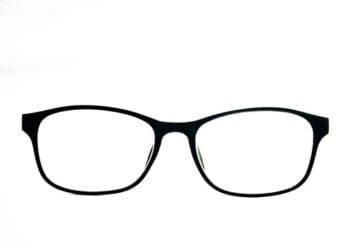Further Reading
Why Cheap Sunglasses Are Dangerous for Your Eyes
Home / Everything About Glasses /
Last Updated:
It takes more than just any old pair of sunglasses to protect your eyes from a bright day. Dark lenses do not necessarily protect your eyes from other types of damage.
Table of Contents
When you purchase new sunglasses, you do not have to buy the designer brands, but you should look for features that protect your eyes, like UV protection, glare protection, and uniform lens shape and tint. Darker tint or polarized lenses will not protect your eyes from problems, and might make issues like UV exposure worse, so you are more likely to suffer eye damage.
The best way to get enough eye protection from your sunglasses is to get prescription lenses from your optometrist or ophthalmologist.
Sunglasses: Are Cheap Frames Okay to Wear?

On bright days, you bust out the sunglasses. If you don’t have any, you may swing by a drugstore or convenience store and grab a cheap pair so you can comfortably be outside.
But sunglasses are important forms of eye protection that should offer more coverage than just darkness. You need to protect your eyes from exposure to ultraviolet (UV) light and glare, just like you protect your skin by wearing sunscreen. Exposure to certain wavelengths of light can damage several parts of your eye and lead to long-term problems.
You deserve clear vision. We can help.
With 135+ locations and over 2.5 million procedures performed, our board-certified eye surgeons deliver results you can trust. Your journey to better vision starts here.
In fact, wearing cheap sunglasses that do not have good light filters can cause worse damage to your eyes over time. Even if you can see just fine on a bright day, you could expose your eyes to more damage than if you did not wear sunglasses at all.
What You Should Look for in a Pair of Sunglasses
You may look at the cost of designer sunglasses and gasp. It’s easy to think there’s no reason to pay that much for a pair of sunglasses when you can get something very similar for less than $10 at a convenience store or outlet mall. If you’re looking at fashion glasses, this is true.
But sunglasses need to be more than an accessory. They are an important way to protect your eyes from harmful wavelengths of light.
Here is what you should look for in a pair of sunglasses so you can protect your eyes:
- UV protection: There are two types of UV radiation to protect yourself from – UVA and UVB. These are associated with a higher risk of skin cancer. They can also damage your eyes if too much of these rays hit the inside of your eye. Finding sunglasses that block 99 to 100 percent of both UVA and UVB will help to keep your eyes healthy.
Exposure to UV light can increase your risk of several eye diseases, including:- Cataracts.
- Macular degeneration.
- Ocular melanoma.
Cheap sunglasses may advertise that they have UV protection, but they are not specific about UVA and UVB protection. Spend time researching types of sunglasses and what percentage of UV rays they protect your eyes from.
- Visible light: Blocking 75 to 90 percent of the rest of the visible light spectrum will protect your eyes from glare. If your eyes aren’t protected, glare can cause damage, including photokeratitis, which is like having a sunburn on your eye.
- High-quality lenses: Finding a pair of sunglasses that have even tinting and curvature in both glasses will reduce eye strain. Cheap sunglasses often have warped lenses, different size lenses, or uneven coloring, which you may not notice until you have been wearing them for several hours.
- Impact resistance: The United States has specific requirements for impact resistance in glasses, but too often, sunglasses do not meet these standards. Research sunglasses and look for lightweight polycarbonate lenses with impact resistance standards listed.
- Full eye protection: Every year, the popular styles of sunglasses will change. If you spend a lot of time outdoors in bright light, especially around snow, water, or another surface that reflects a lot of sunlight, you need to get sunglasses that fully cover your eye. Cheap sunglasses are more geared toward style than substance.
You deserve clear vision. We can help.
With 135+ locations and over 2.5 million procedures performed, our board-certified eye surgeons deliver results you can trust. Your journey to better vision starts here.
Some Specialty Lenses Do Not Protect Your Eyes

There are some aspects of sunglasses that may seem like they provide additional safety, but they are not necessary.
For example, polarized lenses can reduce glare in bright sunlight, but polarization is not the same as UV protection. While you will squint less, on their own, polarized lenses will not prevent harmful UV rays from entering your eye. However, many mid-level polarized sunglasses also have UV protection built into the lens, so look at the product information to see if the sunglasses also protect from UV rays.
There are a range of tints to sunglasses, so you may assume that darker tints provide a similar level of protection from harmful sunlight as UV protected lenses. This is not true.
Darker sunglasses can actually cause your pupil to dilate since your eye reacts to the tint as though you are in a dim room. This might feel better in bright sunlight in the short term, but dilated pupils allow more UV light into your eyes. This can cause damage to your eye faster than wearing no sunglasses at all.
Your Eye Doctor Can Help You Get Fully Protective Sunglasses
Of course, cost has little to do with the overall quality of sunglasses. While a pair of sunglasses from a novelty shop will not offer enough eye protection but will be low in price, there are many pairs of fashionable sunglasses that retail for hundreds of dollars but offer the same level of poor protection.
Instead of wondering whether your new sunglasses offer enough protection, work with your optometrist or ophthalmologist to get a pair of sunglasses that fully protect your eyes. They may cost more than low-quality sunglasses, but you are guaranteed to have the right filters and coverage to keep your eyes healthy.
Talk to your optometrist about your needs for sunglasses. For example, working outside for hours every day is different than skiing regularly, but both activities require protection from the sun. If you have a refractive error or other vision problems, your optometrist or ophthalmologist can include prescription adjustments in the lens, so you have a pair of sunglasses that keep your visual acuity good while also protecting your eyes. These may be covered by your vision insurance too.
Cheap sunglasses can be bad for your eyes, but expensive sunglasses do not necessarily offer more protection. Prescription sunglasses offer guaranteed protection to keep your eyes healthy for years. It’s worth it to spend a little more to ensure your eyes are protected from the sun.
You deserve clear vision. We can help.
With 135+ locations and over 2.5 million procedures performed, our board-certified eye surgeons deliver results you can trust. Your journey to better vision starts here.
References
- Are Cheap Sunglasses Bad for Your Eyes? (January 2018). All About Vision.
- How to Tell if Your Sunglasses Are Really Protecting Your Eyes. (July 2018). Healthcare, University of Utah.
- How to Know if Your Sunglasses Will Protect Your Eyes from Sun Damage. (June 2019). Healthline.
This content is for informational purposes only. It may have been reviewed by a licensed physician, but is not intended to serve as a substitute for professional medical advice. Always consult your healthcare provider with any health concerns. For more, read our Privacy Policy and Editorial Policy.